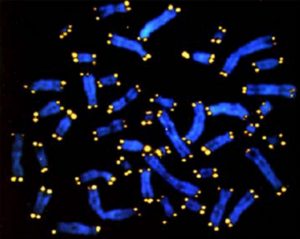Stress, Aging, and Telomeres
All the cells in our body contain tiny clocks called telomeres that can determine how long they will live. Telomeres are little caps at the end of chromosomes that prevent loss or injury to genetic information during cell division. Each time a cell divides, part of the telomere is lost and it becomes shorter. When a telomere eventually disappears because of repeated cell divisions, chromosomal damage prevents the cell from accurately reproducing itself. This shortening and eventual erosion of telomeres are prevented or reduced by telomerase, an enzyme in cells that preserves their length. Many believe that telomere destruction and reconstruction is related to the balance between aging and cancer and explains why cancer is more common in the elderly.
 In the illustration to the left, chromosomes are stained blue and the protective telomere caps at their ends are stained yellow. Cells with long telomeres live longer. Short telomeres have been linked to a wide range of human diseases, including coronary heart disease, osteoporosis, and HIV infection. Shortening of telomeres is prevented or reduced by telomerase, which has been shown to keep immune cells young by preserving their length and ability to continue to divide and reproduce accurate replicas.
In the illustration to the left, chromosomes are stained blue and the protective telomere caps at their ends are stained yellow. Cells with long telomeres live longer. Short telomeres have been linked to a wide range of human diseases, including coronary heart disease, osteoporosis, and HIV infection. Shortening of telomeres is prevented or reduced by telomerase, which has been shown to keep immune cells young by preserving their length and ability to continue to divide and reproduce accurate replicas.
UCLA researchers recently confirmed prior reports that people subjected to chronic stress tended to have shorter telomeres. They have now uncovered a mechanism that explains how stress causes telomere shortening, which could lead to breaking the well-known links between stress and heart disease, as well as accelerated aging. Cells with long telomeres live longer. Short telomeres have been linked to a wide range of human diseases, including coronary heart disease, osteoporosis, and HIV infection. Shortening of telomeres is prevented or reduced by telomerase, which has been shown to keep immune cells young by preserving their length and ability to continue to divide and reproduce accurate replicas.
Chronic stress results in increased secretion of cortisol that causes a rise in blood sugar and blood pressure and reduces inflammation and immune system resistance to infection. However, this new study shows that cortisol also suppresses telomerase activation in immune system cells so that telomeres are no longer protected during cell division and become progressively shorter. This leads to early cell aging and distorted replicas of the original cell that could lead to cancer and other diseases. As the lead author noted in an interview, “We are testing therapeutic ways of enhancing telomerase levels to help the immune system ward off cortisol’s effect. If we’re successful, one day a pill may exist to strengthen the immune system’s ability to weather chronic emotional stress.”
Reference:
Choi J. Fauce SR, Effros RB. Reduced telomerase activity in human T lymphocytes exposed to cortisol. Brain Behavior and Immunity May 2008; 22:600-605
